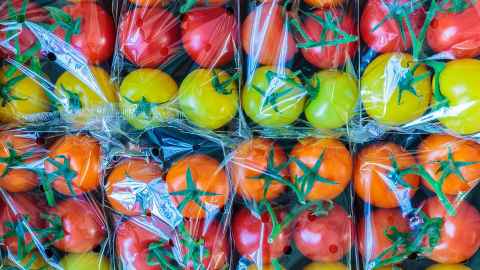When did NZ fall so behind on plastic?
9 July 2019
Opinion: Leave plastic packaging at the checkout for the supermarket to deal with. One idea for Plastic Free July from Emily Joy Frost and Michael Harvey.

The climate movement is making strides at last with Greta Thunberg pushing younger generations to fight for a climate future that will be sustainable and will support them. One question still remains, what about the plastics?
This month marks the annual and global Plastic Free July. But how, or why, do we have an environment which still requires monthly pledges to reduce and refuse plastics? Decisions like this should have already been driven from top-down action, by a government prepared to lead the way.
Instead, in New Zealand, all plastic-related legislation has been driven by bottom up consumer demand pressuring the government to take a hard legislative lead on plastic reduction. But why has this had to be driven by consumers? Why has the government, organisations, supermarkets and brands not driven this type of action from the top down?
Legislative pieces and pledges are in place for this to happen. For example, when Green MP and Minister of Conservation Eugene Sage signed the Clean Seas Pledge and committed the Government to make significant reductions to the production and use of non-recyclable plastics, and single use items like plastic bags, by 2022. Yet here we are, still in a never ending cycle of consumers and individuals shouting from the bottom for dramatic change, with our calls often deflected or not heard at all.
When did New Zealand fall so behind in the global race to reduce and refuse plastics? We have fallen so far behind our Pacific neighbours that our contributions seem abysmal. What can we do about this?
Plastics appear to be in our control as a consumer choice, but is it really? At this point, if you walk through any supermarket, plastic is unavoidable. Even if we move beyond the produce aisle, plastics are in almost every product we choose. There is no denying nor hiding this, they are everywhere. But really, who is to blame? The mother or father who is rushing to do their daily shops in between sports games or practice, or picking children up from school. Or is it the producers themselves?
The fact is, control of plastics in New Zealand will never truly be government-led, nor market-led. It will be led by consumers, through the individual purchases we make, and we must make supermarkets and producers responsible for what they are producing.
It is time to hold such producers, supermarkets, or the brands they sell, to account, through a 'circular economy' which is based on the idea that one day all materials will able to be re-used Such a notion is not new, nor is something the world over hasn’t asked for before. In the UK, the notion of 'shop and drop' has gained momentum and is a statement of support for achieving a circular economy for packaging. Shoppers pay for their goods – and then leave plastic wrappings at the counter. This idea stems from the understanding that the consumers should not be responsible for the end-of-life of plastic products, but the producers themselves. It is time we pushed for this in New Zealand.
We, as consumers, should not be responsible for the end-of-life of these plastics. And we should not be in a position where we are misled by plastic producers who claim their products are bio-degradable or compostable when facilities to enable this process may not be available in New Zealand.
Why should the consumer have to be educated to the point of knowing that this is not an option when it is marketed so broadly, without true marketing of the limits of these alternatives?
The fact is, control of plastics in New Zealand will never truly be government-led, nor market-led. It will be led by consumers, through the individual purchases we make, and we must make supermarkets and producers responsible for what they are producing.
So for this Plastic Free July, why not try for a different type of pledge, a pledge to push for producers to become responsible for what they are producing. This Plastic Free July why not leave excess plastic at the supermarket counter to leave them to manage what they are selling? And why not, through this process, use your power as a consumer to protest because truth is, as, in all things, we are really in control of what should be already happening in a country which calls itself “clean and green”.
So this Plastic Free July, practice your right to highlight circular economy, engage in 'shop and drops’ and most of all refuse, reduce, reuse, recycle.
Emily Joy Frost is a PhD student from the University of Auckland’s School of Marine Science. She is a marine scientist for Oceanus Environmental and scientific advisor to Our Seas Our Future. Michael Harvey is an environmental activist based in Wellington.
This article reflects the opinion of the authors and not necessarily the views of the University of Auckland.
Used with permission from Newsroom When did NZ fall so behind on plastic? on 9 July 2019.